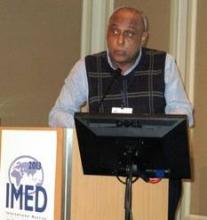VIENNA – Dengue infections surged to new worldwide highs last year, along with the first confirmed cases in Florida in more than 50 years, an ongoing outbreak on Europe’s doorstep on the island of Madeira, and a continued rise in cases elsewhere.
"The number of severe dengue cases [also known as dengue hemorrhagic fever] in the Americas skyrocketed in the past 2 years," in the context of more than 700,000 total cases in Brazil in 2012 and more than 40,000 total cases in Venezuela," Dr. Jaime R. Torres said at the International Meeting on Emerging Diseases and Surveillance.
Although Dr. Torres did not report the specific incidence of severe dengue cases last year, he said that in 2010, public health authorities in the Americas reported a total of roughly 50,000 cases of severe dengue, up from about 25,000 cases per year in 2007, 2008, and 2009, and up from a rate of 10,000 severe cases or less per year as recently as 2001, said Dr. Torres, director of the Tropical Medicine Institute of Caracas, Venezuela. Total dengue cases in the Americas in 2010 reached 1.6 million, according to the World Health Organization (WHO).
The pattern in the Americas dovetails with the worldwide experience, with more than 2.3 million officially reported cases in 2010, according to WHO. The actual number of worldwide cases per year likely ranges from 50 to 100 million, according to recent estimates from WHO.
Against this backdrop came three confirmed cases identified in the Miami area last November, the first confirmed cases in Florida in decades and a potential harbinger of more cases soon.
"Once you have the disease introduced and there is a stable population of the vector mosquito, there is the potential for domestic, person-to-person transmission," said infectious disease specialist Dr. Leo Liu in an interview at the meeting. "Dengue will occur wherever there is the vector," the Aedes mosquito. "It could have as much impact as West Nile virus. It causes a nasty flulike illness with headache and sometimes back or musculoskeletal pain," he said.
Although usually self-limiting in otherwise healthy adults, dengue can cause a more severe infection in elderly or immunocompromised people, or especially if someone becomes infected by a second dengue serotype following a first infection, said Dr. Liu, director of new initiatives for the International Society for Infectious Diseases in Brookline, Mass., the group that organized the meeting.
The dengue outbreak on the island of Madeira, located about 500 miles southwest of Lisbon, began last October and continues into 2013, another 2012 episode underscoring dengue’s spread.
By early February 2013, 2,164 dengue cases had been officially diagnosed in Madeira, Laurence Marrama, Ph.D., said at the meeting. Although the bulk of cases so far occurred last October and November, infections continued at a lower rate during subsequent weeks, with 28 cases reported in 2013 as of early February. The outbreak follows establishment of the Aedes aegypti mosquito on the island in 2005, and is the first sustained transmission in Europe since a 1920s outbreak.
"It is a huge concern" for the European Centre for Disease Control and Prevention, said Dr. Marrama, an epidemiologist with the organization. "Aedes is now very well established in Madeira," and movement of the mosquito and the virus to other parts of Europe is now very possible, she said in an interview.
The ECDC is developing recommendations on mosquito control to present to the Madeira government and the European Commission, she said. Last fall, the ECDC ran a campaign on the island to boost awareness of the dengue risk and to encourage protection against mosquitoes, and the agency also implemented blood-safety steps to curtail dengue transmission by blood products.
Dr. Torres, Dr. Liu, and Dr. Marrama had no disclosures.
On Twitter @mitchelzoler



